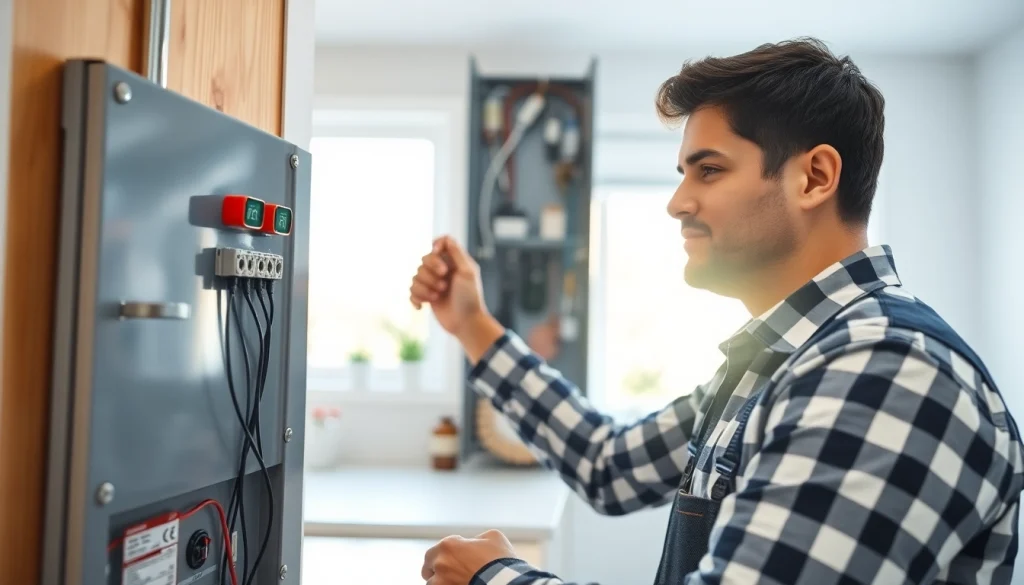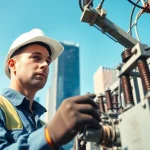Understanding the Importance of an Electrical Panel Upgrade
In today’s technologically advanced world, our reliance on electricity has reached unprecedented levels. From essential appliances to smart home devices, the demand for electrical power in residences has significantly increased. Consequently, ensuring that your home can meet these demands is crucial. This brings us to an often-overlooked but vital component of your home’s electrical system: the electrical panel. An Electrical Panel Upgrade is not just a task on a to-do list; it is an essential step toward the safety, efficiency, and longevity of your home’s electrical infrastructure.
Why Upgrade Your Electrical Panel?
Upgrading your electrical panel provides several benefits. The primary reason for a panel upgrade is to enhance the home’s electrical capacity. Modern families often have a multitude of electronic devices, necessitating more power supply. A new panel can support increased amperage, allowing for more circuits to distribute power effectively. Furthermore, upgrading can enhance safety by reducing the risks of electrical fires due to overloaded circuits and outdated wiring.
An upgraded panel also offers future-proofing benefits. With the rise of electric vehicles (EVs) and home automation systems, investing in a panel capable of handling increased load ensures you won’t be left in the dark—or, more accurately, in the fragile grip of an overloaded system.
Signs That Your Electrical Panel Needs an Upgrade
There are several indicators that suggest it may be time to consider an electrical panel upgrade:
- Aging Equipment: If your panel is more than 20-30 years old, it likely lacks the modern safety features and capacity that newer models offer.
- Frequent Circuit Breaker Trips: Regularly tripping breakers are a sign of overloading circuits, indicating the panel cannot handle the current demand.
- Hot or Discolored Breakers and Panels: If your breakers are hot to the touch or discolored, it suggests overheating, potentially leading to dangerous situations.
- Installing New Appliances or Home Renovations: Adding significant electrical loads, such as a new HVAC system, EV charger, or high-consumption appliances, may necessitate a panel upgrade.
- Using Extension Cords Extensively: Relying on multiple extension cords indicates inadequate outlets or service in your home, hinting at the need for a larger panel.
Common Misconceptions About Electrical Panel Upgrades
Despite their importance, several misconceptions exist regarding electrical panel upgrades:
- Upgrades Are Only for New Homes: Many homeowners believe that only newly constructed homes require upgrades, but older homes can equally benefit from modern panels.
- Electrical Upgrade is Unnecessary if the Current Setup Works: Just because your electrical system appears to function adequately does not mean it is safe or efficient. Hidden risks may exist.
- All Electrical Panels Are Created Equal: Not true; panels vary in quality and capabilities, and it’s crucial to choose a suitable panel that meets your specific needs.
Evaluating the Costs of an Electrical Panel Upgrade
Understanding the costs associated with an electrical panel upgrade can help homeowners plan their budgets effectively. Costs can vary widely depending on various factors that influence the total expense of upgrading a panel.
Breakdown of Average Costs
The average cost to upgrade an electrical panel ranges between $800 and $4,000, dependent on various factors including local labor rates and the specific requirements of your home. Basic panel upgrades typically start at around $800, with more extensive upgrades, including new wiring or additional circuits, pushing costs higher. Here are some average estimates:
- Basic Upgrade (e.g., 100 to 200 amps): $1,200 – $3,000
- Complex Upgrade (with added circuits): $3,000 – $5,000+
Cost Factors: What Influences Pricing?
Several factors affect the final cost of an electrical panel upgrade, including:
- Panel Size: Upgrading to a larger panel (for instance, from 100 to 200 amps) costs significantly more due to materials and installation complexity.
- Labor Costs: Electricians charge varying rates depending on location, experience, and the extent of the job.
- Local Code Requirements: Compliance with local electrical codes may necessitate additional work or materials, affecting overall costs.
- Permits: Some areas require permits for electrical upgrades; these can add to the total expense.
Potential Savings Through Energy Efficiency
Although upgrading might seem like a significant investment upfront, the long-term savings due to energy efficiency can be substantial. Modern panels often include more advanced technology that helps manage energy consumption, reducing electricity bills. Additionally, replacing older, outdated circuits can decrease the likelihood of costly repairs and inefficient energy usage, ultimately adding to homeowner savings.
Choosing the Right Electrical Panel for Your Needs
Choosing the right electrical panel involves understanding the various options available and how they align with your home’s power needs.
Types of Electrical Panels Available
There are mainly two types of electrical panels that homeowners can select from:
- Breakers Panels: These are the most common residential panels, using circuit breakers to protect each circuit. They are easy to reset and maintain.
- Fuse Panels: While less common now, these older systems use fuses and are generally more prone to electrical issues compared to breakers. Homes with fuse panels might consider an upgrade.
How to Select the Appropriate Amperage
Choosing the right amperage is essential for an electrical panel upgrade:
- 100 Amps: This is often sufficient for smaller homes or apartments but may struggle to support modern conveniences.
- 200 Amps: Recommended for most modern homes. This level can handle multiple large appliances, smart devices, and potential future upgrades.
- Higher Options: For custom homes, larger homes, or homes with high electricity demands (like home-based businesses), options like 400 amps may be necessary.
Branded Options: What to Look For
When selecting your electrical panel, consider reliable brands known for safety and durability. Brands such as Square D, Siemens, and Eaton have established reputations in the industry and offer a range of options tailored to varying needs. Consulting with a licensed electrician can also help in choosing the most appropriate panel brand and type according to your home’s requirements.
DIY vs. Hiring a Professional for Your Electrical Panel Upgrade
The decision to upgrade your electrical panel can come with a significant dilemma: undertake the project as a DIY venture or hire a professional. Each option has its pros and cons.
Benefits of Professional Installation
Hiring a certified electrician for the upgrade has several advantages:
- Safety Assurance: Professional electricians adhere to local codes, ensuring safe and correct installation while minimizing risks.
- Expertise: Experienced professionals can assess your home’s unique needs and recommend the best solutions tailored specifically to you.
- Time-Efficiency: Professionals can complete upgrades in a fraction of the time it may take a DIY-er, preventing prolonged electrical outages.
Potential Risks of DIY Upgrades
While some homeowners may be tempted to undertake the project themselves to save money, several risks come with DIY upgrades:
- Safety Hazards: Electrical work can be dangerous; improper installations can lead to fires, injuries, or even fatalities.
- Legal Issues: Without proper permits and inspections, homeowners may face fines or enforcement actions from local authorities.
- Future Complications: Incorrect installations can lead to further electrical issues down the line, increasing repair costs.
How to Find a Qualified Electrician
Finding the right electrician is crucial for a successful panel upgrade. Here are some tips:
- Research Local Options: Use local listings and online reviews to research reputable electricians in your area.
- Check Credentials: Ensure that the electrician is licensed, insured, and has positive reviews or testimonials.
- Request Estimates: Get multiple quotes and compare not just prices but the services and warranties offered.
Post-Upgrade Considerations for Your Electrical Panel
After upgrading your electrical panel, there are several important considerations to maintain its efficiency and safety.
Regular Maintenance Tips for Electrical Panels
To keep your electrical panel functioning optimally, regular maintenance is essential:
- Visual Inspections: Check the panel periodically for signs of wear or damage, such as rust or discoloration.
- Keeping it Clean: Ensure the area around the panel is clean and free of clutter to allow for proper ventilation.
- Professional Inspections: Schedule periodic check-ups with a licensed electrician to ensure all systems are functioning correctly.
How to Monitor Your Electrical Usage Effectively
Monitoring your electrical usage can provide insights about your consumption patterns and help manage costs:
- Smart Meters: Consider installing smart meters that provide real-time data on energy usage, helping you identify trends.
- Energy Audit: Conducting an energy audit can identify wastage areas and offer actionable steps for improvement.
Future-Proofing Your Electrical System
As technology continues to evolve, ensuring your home can accommodate future innovations is vital:
- Plan for Expansion: Consider future electric needs when upgrading, including potential EV chargers or smart home technologies.
- Invest in Quality Equipment: Choose high-quality panels and wiring that can handle increased loads as demands grow.


